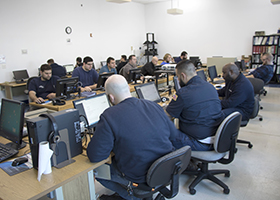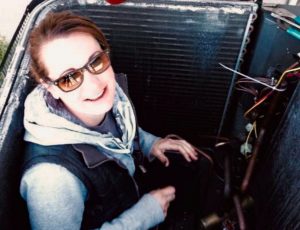
Union HVAC Education vs. Private HVAC Education
Union HVAC technicians are the very best in the business. What makes them the very best is the education and training they get from the union.

New Jersey’s four HVAC locals all train at the state-of-the-art Edward R. Gehm Training Center in Hazlet where students enter a five-year apprentice program and learn on the latest equipment. The education program is a mix of hands-on learning and classroom sessions along with working with a journeyman contractor in the field every day.
For apprentices with some experience, they are tested on their knowledge level and placed based on experience and are placed in the appropriate level class.
Vincent Janovsky, a fifth-year apprentice in Local 9 had 14 years’ experience before joining.
“I went to a private school and paid for it myself. The information was there, but the teachers were technicians and didn’t know how to relay the information well. They had some hands-on training, but it was a lot of book work and you had to do it for yourself,” he said. “Whereas at the union training center the teachers are better at relaying the information properly and your employer is vested in you. They don’t just push you through the program, they make sure you’re actually learning before they promote you to the next year or to a journeyman. It’s more comprehensive and I’m definitely learning things a lot more thoroughly.”
This intensive training is what makes union HVAC technicians renowned for their skills and ability to do the job right the first time.
“The school I went to prior coming to the union didn’t show us much in HVAC, this school goes in-depth into everything,” said Alfonso Colone, Local 475, who had 2 years’ experience before entering the union. “The union training school is leaps and bounds better than anything I’ve been to. Other schools stay in one area of the field, and here it’s very diversified, you get to learn on many different units that we see in the field. We have to be well-rounded in everything.”
“I came over here pretty green, I was a first-year apprentice and I didn’t know much. Now as a fifth-year apprentice, I can go out and troubleshoot units on my own,” he added.
New apprentices soak up all the knowledge the school has to offer and quickly realize the rewards of the intensive on-the-job training along with the state-of-the-art classrooms. Classroom training includes simulation stations where apprentices use virtual reality programs to learn and understand how to troubleshoot problems. Then students go into the workshop and put that knowledge to the test in hands-on simulations with teachers right by their side.
“Training is excellent, they are teaching us how to work on the equipment and to understand it,” said David Cahill, Local 9, who had no formal HVAC training before entering the union training program five years ago. “It really helps you when you go into the field. I feel like the union mechanics are the best and we work on the biggest equipment. To do that you need the best training.”
An important part of the training is the bond that is formed with a journeyman, or experienced HVAC technician, who becomes a mentor. “The relationship with the experienced journeyman is a bonding process and the journeyman is there anytime there is a question or problem,” said Cahill. “It is an easier learning environment, when you’re nonunion it’s sink or swim, you’re out there on your own and everybody is cut-throat. In the union, you can call people and they will help you and work through the problems that you have. Everybody’s got your back.”
This availability of the instructors is a key feature for all the students.
“In your five years here, the teachers become family to you. They always have the phone open to you and tell you to call if you have an issue that you can’t figure out,” said Colone. “I can get in contact with anyone at this school at any time. It’s a great stress reliever because a lot of time you go out in the field it’s just you versus the unit and you can go into panic mode. You always have your cell phone and the teachers will always help you out.”
The benefits of union training are continuing education classes that are available to every union member at no cost. “The continuing education always has the most updated classes on all the new equipment that comes out and it’s free for us to come back and learn,” said Cahill. “Everyone wants the best equipment with all the bells and the whistles, and at school they make sure you understand how that stuff works.”
Industry-leading education is just one of the reasons so many HVAC technicians prefer union life. Find your nearest local to learn more about the robust benefits package that goes along with the earn as you learn education.
- March 1st, 2018
- Blog
- No Comments




